
11 Dec 2023
‘Let battle commence’: Frank’s 5-year-fight against ALL
Frank Murphy’s fight against leukaemia defied all predictions and is a source of great pride to his daughter Louise. It all started in April 2015. Frank was enjoying life in Belfast with his wife Jacqueline and working as normal when he started to suffer from extreme tiredness.
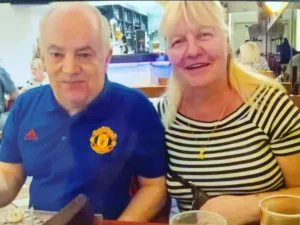 “One Saturday, they were supposed to go to a wedding and he couldn’t get out of bed,” said Louise, who also lives in Belfast. “The next day he came downstairs to watch the team he’d followed all this life play, his beloved Manchester United, and then went straight back to bed. He was also losing a lot of weight. Mum got him an appointment at the GP and I knew he was really ill because he allowed me to drive him – he hated my driving! He wouldn’t let me come into the doctors and as I watched him basically shuffle in with his clothes hanging off him, I knew something was very wrong.”
“One Saturday, they were supposed to go to a wedding and he couldn’t get out of bed,” said Louise, who also lives in Belfast. “The next day he came downstairs to watch the team he’d followed all this life play, his beloved Manchester United, and then went straight back to bed. He was also losing a lot of weight. Mum got him an appointment at the GP and I knew he was really ill because he allowed me to drive him – he hated my driving! He wouldn’t let me come into the doctors and as I watched him basically shuffle in with his clothes hanging off him, I knew something was very wrong.”
Frank was initially thought to have a viral infection. But after a few GP appointments, on this occasion, he saw a new locum doctor who immediately sent him to the Royal Victoria Hospital in Belfast for tests. Louise took him straight there.
Discovering a ‘blood issue’
“When they put him on the couch I could see what I can only describe as like a hump back bridge shape in his abdomen which was later revealed to be the influx of leukaemic cells in his spleen,” said Louise. “His family had a history of pancreatic cancer so that’s what I was worried about. I also noticed he had little bruises on his hands. But they thought it was his gallbladder. They scheduled him in to have his gallbladder removed the next day and continued doing blood tests.
“But then when the day came, Mum rang him and he said they weren’t going to operate and he was being transferred to Belfast City Hospital for a ‘blood issue’.”
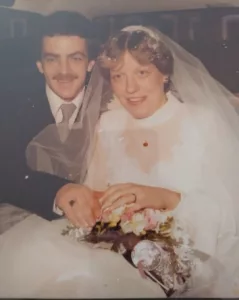 Louise’s mum Jacqueline and brother John both took half days from work and went straight to 10 North at Belfast City Hospital to meet Frank there.
Louise’s mum Jacqueline and brother John both took half days from work and went straight to 10 North at Belfast City Hospital to meet Frank there.
“When they got there he still hadn’t got a diagnosis but as soon as they looked at the other patients it was obviously a cancer ward,” said Louise. “One of the other patients asked Dad what he’d been diagnosed with and which prompted mum to find a doctor to find out exactly what was going on.”
On 29th April 2015, at the age of 58, Frank was diagnosed with acute lymphoblastic leukaemia (ALL). Although ALL can affect people of all ages, it is most commonly diagnosed in children aged 0-4 years.
Always calm and practical
“The doctor who told us didn’t go into any detail and we were in shock,” said Louise. “But then we met his consultant, Dr Cuthbert, who would be brilliant all the way through. He was very honest and said because of Dad’s age and cardiac history he wasn’t eligible to have a stem cell transplant. The only treatment was medication, and even with that it wouldn’t be long before we reached the end of the road. There was also the added complication of Dad also having the ‘Philadelphia positive’ type of the disease. He said all things considered Dad had a minimal chance of surviving until the end of the year. We were all in pieces of course, but Dad was so calm and practical, as he remained the whole way through.”
Frank’s first of three rounds of intensive chemotherapy started immediately. He remained in hospital for 17 weeks, including a spell in intensive care with a bout of sepsis.
“The doctors were preparing us that he might not make it, but he did. The nurses nicknamed him Lazarus as he was at death’s door several times but was so strong and always bounced back. He became a bit of a legend on the ward, taking many of the new patients under his wing, and everyone loved him. He would never sugar coat what the treatment was like, but he would be kind with it. Many of his fellow patients and staff kept in contact with him afterwards.”
In August Frank was declared to be in remission and was sent home. He was put on numerous medications including a new drug trial aimed at people in the older age group for ALL. “He called all the chemo drugs ‘the nibs’ as all their names ended with ‘nib’!” said Louise. “The effects of the first ‘nib’, Imatinib, didn’t last long and his consultant had to push hard for permission for him to be given Disatinib. We got it just before Christmas, and it worked really well.”
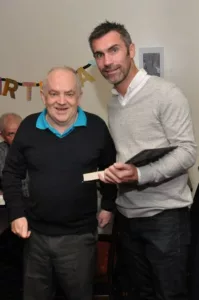
Celebrating Frank’s 60th
Frank continued to make progress and returned back to work part time. In September 2016 he celebrated his 60th birthday.
“It was such a milestone for us as we didn’t think he’d make it,” said Louise. “We had a surprise party, and a lot of the nurses and his friends from the hospital came. We also got the footballer Keith Gillespie along as a surprise for him – he used to play for Manchester United and Northern Ireland. He was a lovely guy and it was a great craic!”
Throughout 2017 Frank continued to have regular blood tests and a regime of medication. The family were able to enjoy holidays and trips together, making precious memories. This included what would be Frank’s his last visit to Old Trafford in May 2017 to see his beloved Manchester United beat Crystal Palace. But in June 2018 he started to suffer from severe headaches and fatigue.
“We went out for Father’s Day lunch and he came home and got on the sofa and slept for five hours,” said Louise. “Mum said he’d been going through boxes of painkillers for headaches and his colour looked really grey. I said this isn’t right I’m going to contact Dr Cuthbert.
‘Worst case scenario’
“He was admitted to hospital for tests. First they thought it was neurological problem, then a cardiac issue. Initially they told us the main thing was the leukaemia hadn’t come back. But just a few days later after a bone marrow biopsy we were then given the awful news that it had, and that it was ‘worst case scenario’ and had spread to his brain and nervous system. It was Thursday and we were told it was unlikely he would last the weekend.”
By this time Frank was having seizures and was barely conscious. It was decided to try three separate drugs by lumbar puncture aimed at attacking the leukaemia cells in as extreme a way as possible. Over the course of his entire treatment, Frank underwent a staggering 27 lumbar punctures.
“They started on Friday and by Monday there was such a change in him,” said Louise. “He was conscious and chatty, and the World Cup was on and he was watching it with my brother. One of the pharmacists who knew him well came by and said it was like the old Frank had returned.”
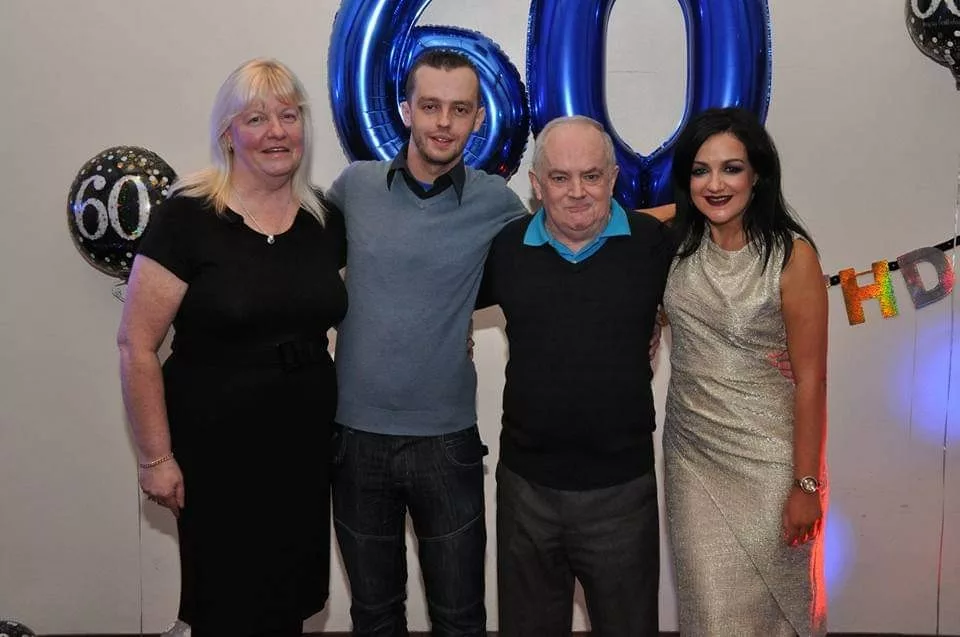
The family was told first round of treatment killed off around 85% of Frank’s leukaemia cells. Against the odds, just weeks later, Frank was back in remission and discharged home. But he had developed peripheral neuropathy due to the severity of the chemotherapy and had trouble walking. Jacqueline was working full time so Louise’s brother John helped care for Frank during the weekdays and Louise stayed and helped out at weekends. And the timing couldn’t have been better, as Louise was able to tell Frank she was pregnant with his first grandchild. Caleb was born a month early on 21st December 2018, and the newly expanded family were all together for Christmas.
“Caleb absolutely loved his ga-ga as he called him,” said Louise. “Even now says he misses him and asks questions about him and says he wants to go to Heaven to visit him.”
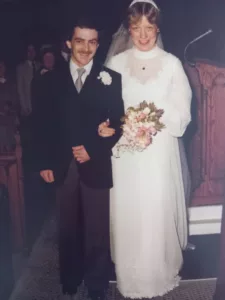
“I will never understand why it happened”
Heartbreakingly the family’s precious time all together was cut short just a few months later in April 2019, when, completely out of the blue, Jacqueline suffered a catastrophic bleed to the brain.
“They’d been to hospital for dad’s check up, ironically,” said Louise. “They got home and mum said she didn’t feel too good. Dad phoned me and I missed the call as I was giving Caleb a bottle. He said mum wasn’t well – she was never ill so I presumed it was just a tummy bug but when I called back he said he thought she’d had a stroke and the ambulance was coming. She was in intensive care for six days and never regained consciousness. They then took the decision to remove her life support. She didn’t drink, didn’t smoke, ate healthy, walked everywhere, and was only 57. After having come through everything with dad to have this happen to mum…I will never understand why it happened.
“Dad was absolutely devastated. He almost had a guilt that it wasn’t him. One day when we went to the cemetery to visit mum’s grave he said I’m sure you were expecting it to be me first.”
Louise had hardly any time to grieve the loss of her mum when there was another shock. The next month, May 2019, during a routine blood test, it was found that Frank’s leukaemia had returned.
“That was such a hammer blow,” said Louise. “We had just buried mum, and now it was back into hospital with dad and more chemo. He went through another round of sepsis but again went into remission and came home. Then he had pancreatitis and had to go back into hospital again. And then in December 2019 he had a heart attack. The doctors said that the chemotherapy drug he was on – Ponatinib – was the cause so they reduced it. They couldn’t take him off because otherwise the leukaemia would return. But in February 2020 he had another heart attack. It was horrible, because I knew by now we were quickly running out of treatment options.”
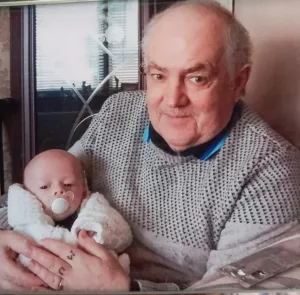 Frank was changed across to Bosutnib but continued to be unwell. In July 2020 the family were told his leukaemia was back and this time it was terminal.
Frank was changed across to Bosutnib but continued to be unwell. In July 2020 the family were told his leukaemia was back and this time it was terminal.
“Our goal was to get Dad home at that point because that’s what he wanted – but it was a struggle,” said Louise. “He had sepsis again, he was hallucinating and they were giving him double blood and platelet transfusions every day to try and get on top of it. Fortunately we had a brilliant palliative care nurse who sat down with me and reviewed his medication and made some changes, reducing the dose of one particular drug. Miraculously he rallied yet again.”
Frank was able to go home for his 64th birthday on 27th September 2020. He remained at home supported by Louise and John and carers, who Louise says more often than not were greeted by a fully-dressed and washed Frank who offered to make them a cup of tea and invited them to have a sit down! But, just two weeks later, Frank began to get pains in his head and shoulder, and one day woke up to find he’d lost all the strength in his left side.
“He was taken to hospital again. I spoke to him on the Thursday and he sounded bright. That was his last good day. On the Friday during another scan, he collapsed and went into a temperature spike which they could not get on top of. By this time we were in the midst of Covid and we were told that even though Dad was in palliative care he wasn’t ‘end of life’, so we weren’t allowed to visit him, which was so, so hard.”
A matter of hours
“My brother and I rang the ward every couple of hours to check on him. On the Sunday, I was allowed an hour with him. He was unconscious and I doubt he even knew I was there. On the Monday morning around 10.30am, a new doctor came in and took me into the corridor and said they felt it was only a matter of hours. He’d always rallied before and I just couldn’t believe it. They gave him morphine and he settled and we said to him Dad try and have a sleep, get some rest because he was just so exhausted.”
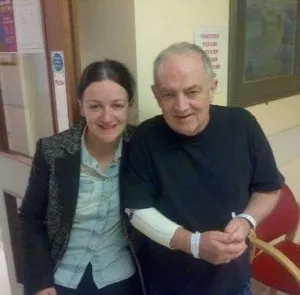 Frank died at 2pm on 19th October 2020 with Louise and John by his side, exactly 18 months to the day from Jacqueline’s funeral.
Frank died at 2pm on 19th October 2020 with Louise and John by his side, exactly 18 months to the day from Jacqueline’s funeral.
Since losing her dad, Louise has struggled with the trauma of what the family went through with Frank’s leukaemia and the sudden loss of her mum. She is still receiving counselling for PTSD. But she is deeply proud of her dad and how he defied the odds of survival for several years.
“When the consultant told dad he had leukaemia dad said ‘let the battle commence’. He was given minimal chance of making it to the end of the year. He went on to survive for five and a half years and got through three relapses, seven bouts of sepsis, a brain bleed and two heart attacks before he died. The way he fought it was incredible to watch.
“Whilst there’s no doubt the treatment he had played a huge part in us having that extra time with him, it’s so sad that he suffered so much, often as a result of the medication he had to take just to keep him alive. We need new treatment and more research. Leukaemia is a disease that can affect everyone, young and old. Some of the treatments haven’t been updated since the 1970s. We often hear of all these new medical advances, but sadly it feels like leukaemia is all too often left in the dark, especially when it comes to funding and research, particularly into the rarer types of the disease.
“I don’t like to refer to it as a fight, because there’s a connotation then that the person ‘lost’ their fight. My Dad was an absolute inspiration. Despite everything he went through, he never once complained or gave up. Every part of him wanted to live and he kept going until his body couldn’t go on anymore. I miss him more than anything, but the greatest honour in my life is having him as my dad. We hear people talk about footballers or actors as legends. For me, that word just sums up my dad.”
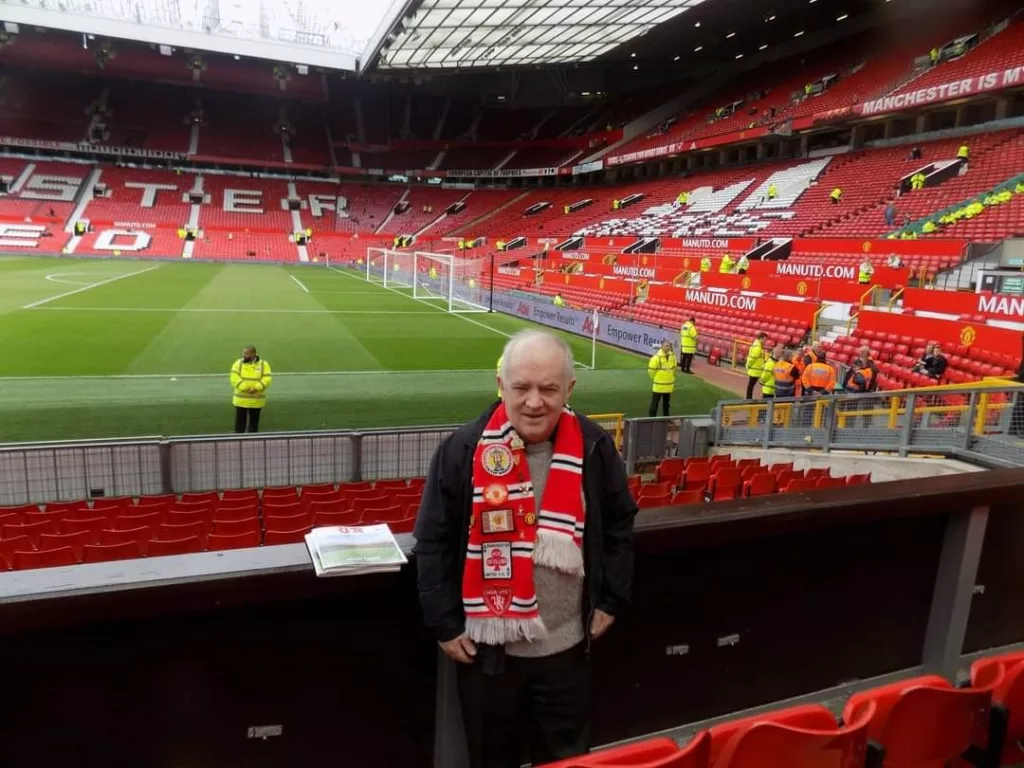
Learn about the signs and symptoms of leukaemia.
Related posts
4 April 2023
£200 grants for people affected by leukaemia once again available
Leukaemia UK and Leukaemia Care have this month relaunched the ‘Cost of Living Fund’, providing financial grants of £200 to patients with leukaemia, myelodysplastic syndrome (MDS) or myeloproliferative neoplasms (MPNs),…
15 February 2024
Parents join Leukaemia UK in calling for more donations to fund research to stop blood cancer ‘destroying childhoods’
Parents of children whose lives have been devastated by leukaemia have joined Leukaemia UK on International Childhood Cancer Day (February 15th) in calling for more research into the blood cancer. …
11 January 2019
Myelofibrosis: Finding new ways to treat patients
Dr Edwin Chen, University of Leeds and John Goldman Fellow
18 November 2024
Leukaemia UK’s Patient Care Pioneer Award fuels innovative research to revolutionize ‘watch and wait’ approach
Leukaemia UK is excited to announce Professor Francesco Forconi from University Hospital Southampton (UHS) as the first recipient of its Patient Care Pioneer Award. Through this new funding initiative, Professor…